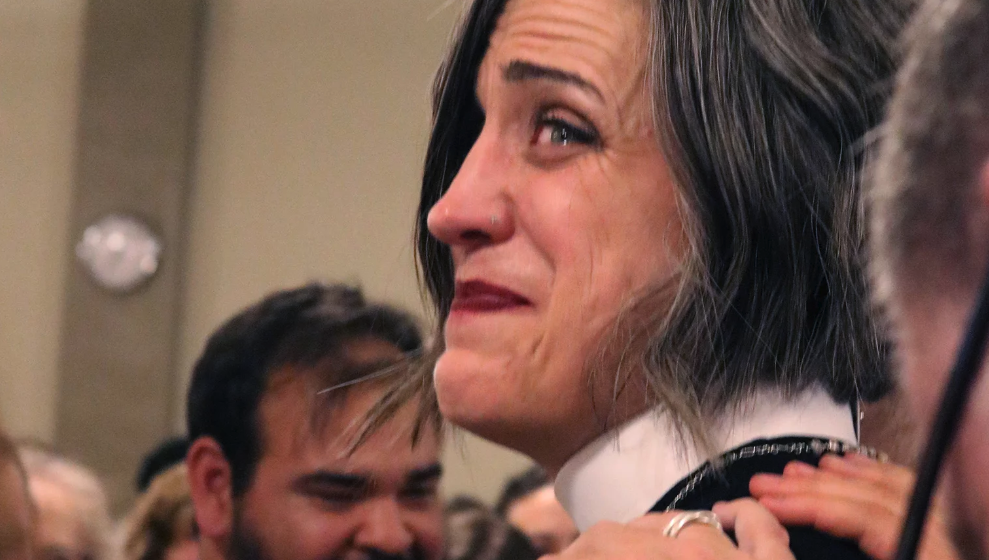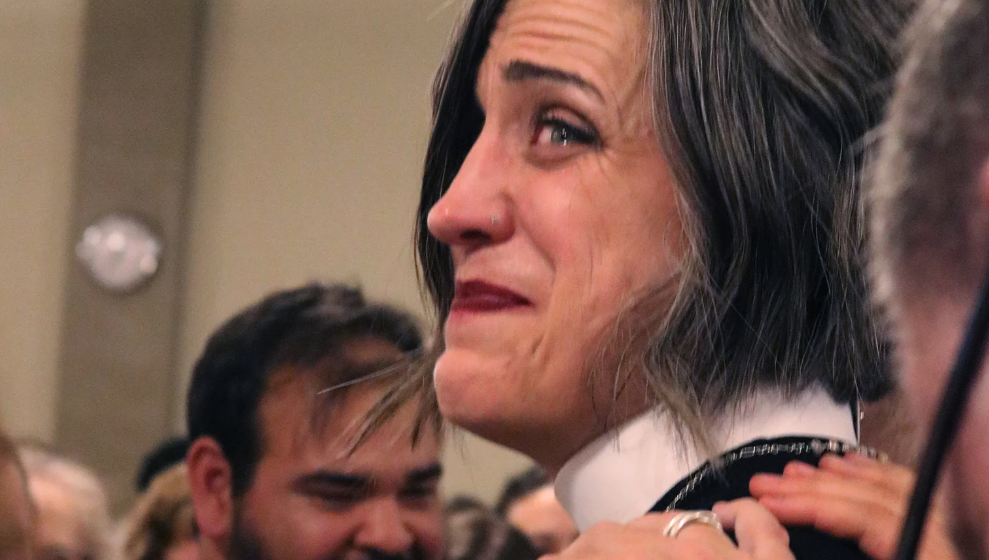
As in her life, Rachel Held Evans was surrounded by heretics and applauded by apostates at her death. She was ‘anointed’ with oil in the hours before her passing by the self-professed “profane bulldyke” and mannish, self-graffitied, vulgar blasphemer, Nadia Bolz-Weber, who better personifies the Grim Reaper than perhaps anyone in a clerical collar. It’s hard to believe that anyone ushered into the world to come by Bolz-Weber would be ushered into the right world.
Perhaps her own tweet conveys this point the best.
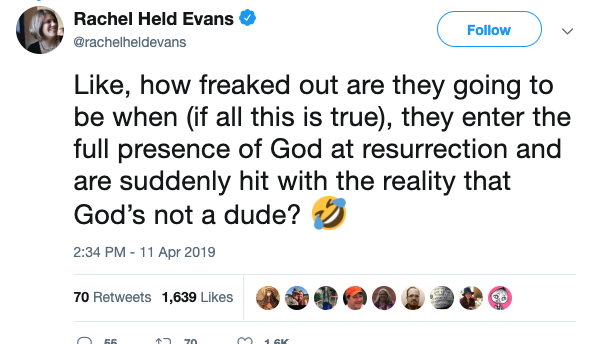
Evans knows that God is male now. She also knows so much more. The God she expected to see is not the God she now knows.
Evans, who has used her life’s energy to attack the authority and inerrancy of the Scripture, Biblical gender roles and sexual ethics, and commit all kinds of ontological heresies against God, has been eulogized as though a saint after her death by many who criticized her as an enemy of Biblical Christianity during her lifetime.
For many, theological debate is Kabuki theater, where each side has a role to play and even the audience has a part to act out. There are protagonists and antagonists who spar on stage, but go out afterward to celebrate their dramatic endeavors and the show they’ve put on for the masses. This is all basically a more sophisticated version of the showmanship of professional wrestling.
However, some of us religious types view apostasy as a serious matter. Furthermore, some of us think hell is real. Likewise, we think people actually go there. And, we believe that we know what it takes to avoid that place. Ergo, we take theology, you know…seriously and stuff.
Pulpit & Pen ran two articles over the weekend about Rachel Held Evans, one by Greg Smith and one by Seth Dunn. Both pointed out that (this is my paraphrase) she was an apostate, is probably in hell, that we should mourn the loss of her soul, and pray for her family.
We weren’t the only ones to speak the obvious (and to write what most were thinking).
Reformation Charlotte made a tweet about Evans, which was held up to scorn by the politically conservative Papist, Matt Walsh.
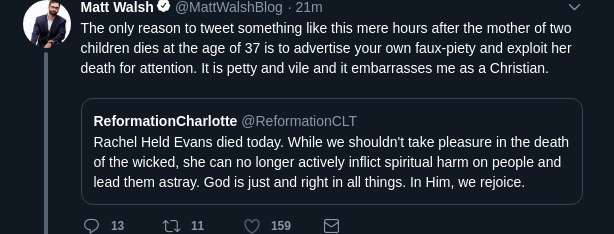
Fans of Rachel Held Evans, which mostly include leftists, atheists, and homosexuals, used criticism toward Evans as an opportunity to signal their own morality.
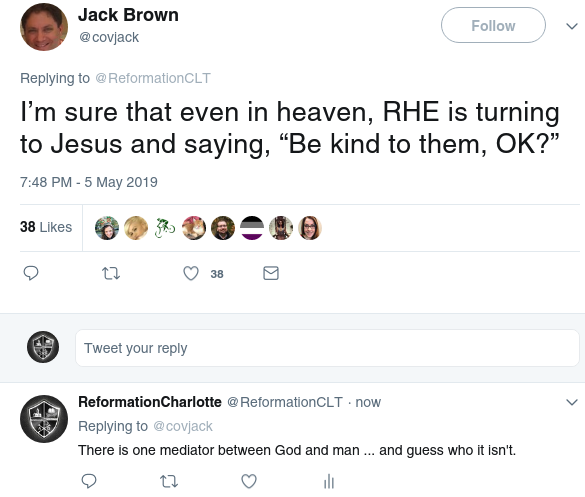
Emily Thomes, a Christian of some notability for being a former homosexual-turned-convert, posted a comment expressing similar sentiments, which she eventually deleted after receiving so much negative feedback (by the way, she’s not a fan of our publication).
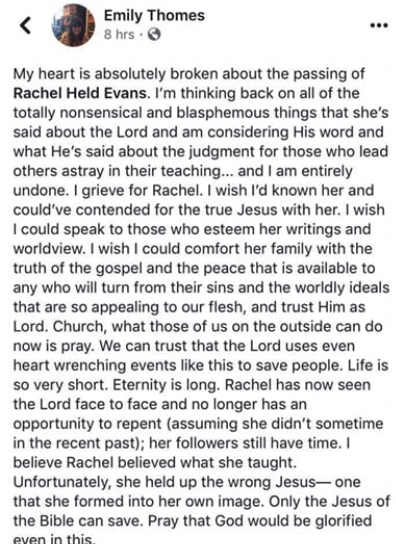
Thomes also suffered from an attack of the Outrage Machine, which turns to devour person by person by person until all opposing points of view are masticated like the crumbs in the Cookie Monster’s tummy. She caved under the pressure.
Reformed Baptist pastor, Robert Truelove, also had words of similar sentiment:
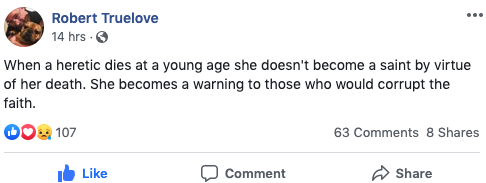
Those pointing out the obvious, those writing what every one else was already thinking (that Rachel Held Evans is most likely in hell, and that rightful presumption makes her death just that much more tragic), were few, however.
Most evangelicals (and Catholic sidekicks, like Walsh above) were signaling their virtue by acting as though the theology of Rachel Held Evans was a contribution to Christianity rather than a cancer.
The general disagreement with our posts, which might best be summarized by Wade Burleson’s blog post about us, is that (to summarize) first, it is improper to judge eternal fates and second, the timing is off. Some of the Survivor Blog women with whom Evans’ feminism resonated so well, sent me messages asking us to refrain from commenting for the time being. They were already too late with their request at the time of publication.
One Facebook friend asked the question:

My response was as follows:
Serious Answer: My assumption on this is that we have a pretty delicate but unspoken sense of decorum that is socially enforced (rather than biblically or logically obtained) that demands an unofficial grieving period, cease-fire, and statements of appreciation (no matter how insincere). Then, we confuse breaches of this custom of decorum with being “unchristian,” when really, it’s just being un-21st Century.
There absolutely does seem to be a breach of an existing standard of decency when we criticize someone after their death. The only question, for me, is from where comes this standard. Only then, when we determine from whence comes this standard, can we ascertain if we are being godly or worldly in our response to dead heretics.
First, we are told to preach both in season and out of season (2 Timothy 4:2). The term season is eukairōs and means ‘opportune.’ This is why the HCSB translates “in season and out of season” as “whether it is convenient or inconvenient.”
Many – if not most – responses of outrage to us include the phrase, “She’s not even been dead 24 hours yet!” I have on several occasions asked how many hours need to pass before we can point out more will follow her to hell if they follow her theology.
“What’s the Biblically-required time to wait before we get back to the heart-crushing, soul-damning heresy she’s guilty of committing? Is it a week? Should we wait a month? A year? Never? Be specific. What time does God require?”
Never is there an answer provided. They just tell us it’s not nice to do it so soon, without any objective standard as to how soon is too soon. There is no nice way to say what needs to be said, that this woman is probably in hell and if you follow after her, you’ll go there as well. But I suspect that they don’t want us to be nice. They want us to be silent.
Ultimately, the criticism is that the preaching is just not, for the time being, in season. Indeed and agreed. But, we’re told to preach when it’s not in season, too. We’re not protesting her funeral. We’re protesting in our publication. If you don’t like it, don’t read it. Go to Evan’s funeral and play your role in the Kabuki theater as everyone pretends she wasn’t an enemy of God and some butch lesbian does the eulogy. We’re certainly not going to disturb your special time in the Neighborhood of Make Believe. Have your ceremonies.
Second, Jesus ought to be our example. In Luke 13, Jesus’ teaching had been interrupted with the news that several tragedies had taken the lives of people in untimely ways. Jesus’ response was immediate; he turned to the crowd and said, “Repent, lest ye likewise shall perish.”
Jesus preached out of season and used death as an opportunity to remind people that they must repent while there’s still yet time.
God, who is impassible and just, does not mourn those in Sheol. Our emotions – one of the many attributes we do not share with God – make it impossible for us not to mourn the passing of our friends, for in his humanity, even Jesus wept (John 11:35). However, I see nothing commanded me in Scripture to mourn those who, unlike Lazarus, are enemies of the Almighty God. I do see prohibitions against rejoicing in their demise (Psalm 24:17). I see no prohibition against using their passing as an opportunity to warn people not to go the same way as the deceased (the same way Jesus did).
Ultimately, the problem I see in Snowflake Christianity is that we act as though the consequence for heresy ends when someone dies. Rather, it is the opposite. Death is when the consequences for heresy really just begins.
[Contributed by JD Hall]

